![]() They started out last year as a crowded field of hopefuls from around the world, each dreaming of a chance to perform under the big lights. Over months, their numbers dwindled as the level of competition rose; each successive round brought new disappointment to those eliminated and new hope to those left in the running. And now, whittled down to an elite few, they’re ready for the global stage.
They started out last year as a crowded field of hopefuls from around the world, each dreaming of a chance to perform under the big lights. Over months, their numbers dwindled as the level of competition rose; each successive round brought new disappointment to those eliminated and new hope to those left in the running. And now, whittled down to an elite few, they’re ready for the global stage.
Okay, I’m giving myself a yellow card: So maybe the World Cup isn’t the perfect metaphor for the Knight News Challenge. But the News Challenge is the closest thing the future-of-news space has to a World Cup, and while this year’s 12 winners — just announced at MIT — won’t be forced to battle each other for global supremacy, they do represent the top of a sizable pyramid of applicants — nearly 2,500 in all. You can judge for yourself which ones are Brazil and Germany and which are New Zealand and North Korea.
I’ve got information on all the winners below, but first a few observations:
— Visuals seem to be this year’s theme: lots of projects about things like mapping, data visualization, video editing, and games inspired by editorial cartoons. Just one winner focuses on the business-model end of the equation (Windy Citizen’s real-time ads).
— This year’s new grants total $2.74 million. That’s up from last year’s total of $1.96 million, but still down substantially from the really big checks Knight was writing in the first two years of the News Challenge ($11.7 million in 2007, $5.5 million in 2008). The number of grantees is also up a bit from 2009 but well below earlier years (26 in 2007, 16 in 2008, 9 in 2009, 12 this year).
But that doesn’t necessarily mean that Knight’s overall commitment has decreased over time. Many of its grants are distributed over multiple years, so some of those early commitments are still being in force.
— Despite extending this cycle’s application deadline in part to encourage more international applicants, the winners are quite domestic — 11 American winners out of 12. In 2008, there were six international winners, and last year there were two projects that, while technically based in the U.S., were internationally focused — Ushahidi and Mobile Media Toolkit. (You could argue that this year’s One-Eight should count as international, since it’s about covering Afghanistan, but through collaboration with the U.S. military. And while Tilemapping will focus on Washington, D.C., a version of its software was used after the Haiti earthquake.)
That said, the deadline extension was also about reaching out for other kinds of diversity, and that happened in at least one way: Knight reports that nearly half of this year’s winners are private companies, up from 15 percent in 2009. That’s despite Knight’s elimination of a separate category for commercial applicants last cycle.
Below are all the winners — congratulations to one and all, and my sympathies to the thousands eliminated along the way. In the coming days, we’ll have profiles of all of the winners and their projects. In the meantime, for context, you can also read all we wrote about last year’s News Challenge and what we’ve written so far about this cycle.
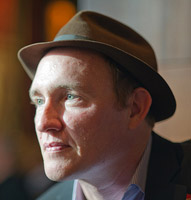 The winner: Eric Rodenbeck of Stamen Design
The winner: Eric Rodenbeck of Stamen Design
The amount: $400,000
The pitch: “To make municipal data easy to understand, CityTracking will allow users to create embeddable data visualizations that are appealing enough to spread virally and that are as easy to share as photos and videos. The dynamic interfaces will be appropriate to each data type, starting with crime and working through 311 calls for service, among others. The creators will use high design standards, making the visuals beautiful as well as useful.”
 The winner: Ian Bogost of Georgia Tech and Michael Mateas of UC Santa Cruz
The winner: Ian Bogost of Georgia Tech and Michael Mateas of UC Santa Cruz
The amount: $378,000
The pitch: “To engage readers in the news, this project will create a free tool that produces cartoon-like current event games — the game equivalent of editorial cartoons. The simplified tools will be created with busy journalists and editors in mind, people who have the pulse of their community but don’t have a background in game development. By answering a series of questions about the major actors in a news event and making value judgments about their actions, The Cartoonist will automatically propose game rules and images. The games aim to help the sites draw readers and inspire them to explore the news.”
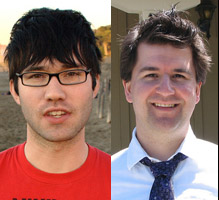 The winner: Philip Neustrom and Mike Ivanov of DavisWiki.org
The winner: Philip Neustrom and Mike Ivanov of DavisWiki.org
The amount: $350,000
The pitch: “Based on the successful DavisWiki.org in Davis, Calif., this project will create enhanced tools for local wikis, a new form of media that makes it easy for people to learn and share their own unique community knowledge. Members will be able to post articles about anything they like, edit others and upload photos and files. This grant will help create the specialized open-source software that makes the wiki possible and help communities develop, launch and sustain local wiki projects.”
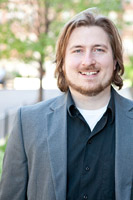 The winner: Brad Flora of WindyCitizen.com
The winner: Brad Flora of WindyCitizen.com
The amount: $250,000
The pitch: “As a way to help online startups become sustainable, this project will develop an improved software interface to help sites create and sell what are known as real-time ads. These ads are designed to be engaging as they constantly change showing the latest message or post from the advertisers Twitter account, Facebook page or blog. Challenge winner Brad Flora helped pioneer the idea on his Chicago news site, WindyCitizen.com.”
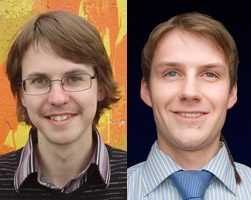 The winner: Marcis Rubenis and Kristofs Blaus
The winner: Marcis Rubenis and Kristofs Blaus
The amount: $250,000
The pitch: “To inspire people to get involved in their community, this project will create a live, online map with local news and activities. GoMap Riga will pull some content from the Web and place it automatically on the map. Residents will be able to add their own news, pictures and videos while discussing what is happening around them. GoMap Riga will be integrated with the major existing social networks and allow civic participation through mobile technology. The project will be tested in Riga, Latvia, and ultimately be applicable in other cities.”
 The winner: John Davidow of WBUR
The winner: John Davidow of WBUR
The amount: $250,000
The pitch: “To foster greater access to the judicial process, this project will create a laboratory in a Boston courtroom to help establish best practices for digital coverage that can be replicated and adopted throughout the nation. While the legislative and executive branches have incorporated new technologies and social media, the courts still operate under the video and audio recording standards established in the 1970s and ’80s. The courtroom will have a designated area for live blogging via a Wi-Fi network and the ability to live-stream court proceedings to the public. Working in conjunction with the Massachusetts court system, the project will publish the daily docket on the Web and build a knowledge wiki for the public with common legal terms.”
 The winner: Michael Wood-Lewis of Front Porch Forum
The winner: Michael Wood-Lewis of Front Porch Forum
The amount: $220,000
The pitch: “To help residents connect with others and their community, this grant will help rebuild and enhance a successful community news site, expand it to more towns and release the software so other organizations, anywhere can use it. The Front Porch Forum, a virtual town hall space, helps residents share and discuss local news, build community and increase engagement. The site, currently serving 25 Vermont towns, will expand to 250.”
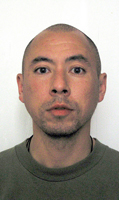 The winner: Teru Kuwayama
The winner: Teru Kuwayama
The amount: $202,000
The pitch: “Broadening the perspectives that surround U.S. military operations in Afghanistan, this project will chronicle a battalion by combining reporting from embedded journalists with user-generated content from the Marines themselves. The troops, recently authorized to use social media while deployed, and their families will be key audiences for the online journal steering, challenging and augmenting the coverage with their feedback. The approach will directly serve the stakeholders and inform the wider public by bringing in on-the-ground views on military issues and the execution of U.S. foreign policy.”
 The winner: USC Annenberg’s Nonny de la Peña and Tom Grasty
The winner: USC Annenberg’s Nonny de la Peña and Tom Grasty
The amount: $200,000
The pitch: “To simplify the production of news video, Stroome will create a virtual video-editing studio. There, correspondents, editors and producers will be able to upload and share content, edit and remix with friends and colleagues — all without using expensive satellite truck technology. The site will launch as eyewitness video — often captured by mobile phones or webcams — is becoming a key component of news coverage, generating demand for supporting tools.”
 The winner: Arizona State’s Retha Hill and Cody Shotwell
The winner: Arizona State’s Retha Hill and Cody Shotwell
The amount: $90,000
The pitch: “To inform and engage communities, CitySeed will be a mobile application that allows users to plant the ‘seed’ of an idea and share it with others. For example, a person might come across a great spot for a community garden. At that moment, the person can use the CitySeed app to geotag the idea, which links it to an exact location. Others can look at the place-based ideas, debate and hopefully act on them. The project aims to increase the number of people informed about and engaged with their communities by breaking down community issues into bite-size settings.”
 The winner: Jake Shapiro of PRX
The winner: Jake Shapiro of PRX
The amount: $75,000
The pitch: “Building on the software created by 2008 challenge winner Spot.us, this project will allow anyone to pitch and help pay to produce a story for a local public radio station. When the amount is raised (in small contributions), the station will hire a professional journalist to do the report. The project provides a new way for public radio stations to raise money, produce more local content and engage listeners.”
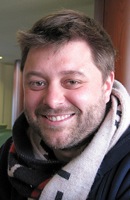 The winner: Eric Gundersen of Development Seed
The winner: Eric Gundersen of Development Seed
The amount: $74,000
The pitch: “To inspire residents to learn about local issues, Tilemapping will help local media create hyper-local, data-filled maps for their websites and blogs. Journalists will be able to tell more textured stories, while residents will be able to draw connections to their physical communities in new ways. The tools will be tested in Washington, D.C. Ushahidi, a 2009 Knight News Challenge winner, used a prototype after the earthquake in Haiti to create maps used to crowdsource reports on places needing aid.”